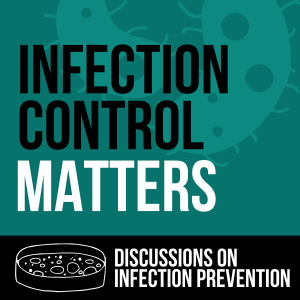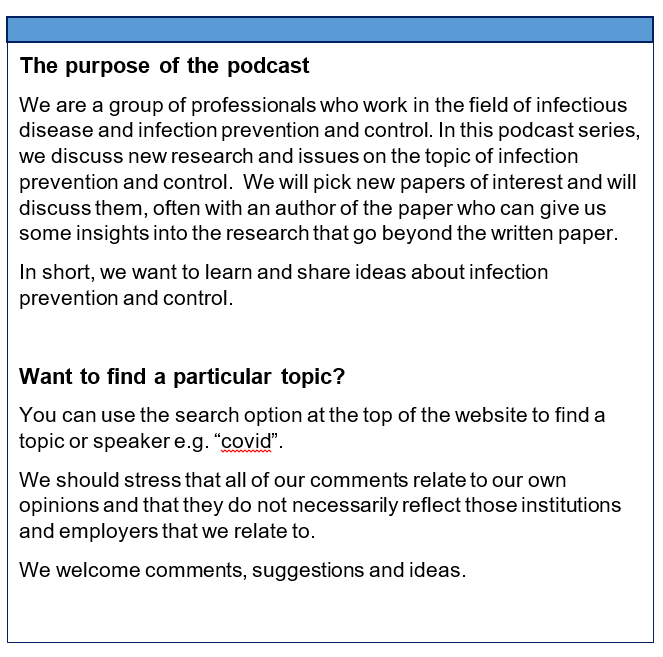Infection Control Matters
We are a group of professionals who work in the field of infectious disease and infection prevention and control. In this podcast series, we discuss new research and issues on the topic of infection prevention and control. We will pick new papers of interest and will discuss them, often with an author of the paper who can give us some insights into the research that go beyond the written paper. Authors will include nurses, doctors, academics, clinicians, administrators and leaders. We should stress that all of our comments relate to our own opinions and that they do not necessarily reflect those institutions and employers that we relate to. We welcome comment, suggestions and ideas. Please consider subscribing for updates and to find collections of topic specific podcasts at www.infectioncontrolmatters.com
Episodes

Saturday Oct 01, 2022
Saturday Oct 01, 2022
In part 2 of this series on the current IPC paradigms of contact, droplet and airborne, we hear from a range of guests on this topics.
This week we talk to:
Rhonda Stewart (Australia)
Kalisvar Marimuthu (Singapore)
Gonzalo Bearman (USA)
Belinda Henderson (Australia)
Jan Kluytmans (Netherlands)
Caroline Marshall (Australia)
If you haven't listened to the previous episode (last week), please listen to that first.

Wednesday Sep 21, 2022
Wednesday Sep 21, 2022
In this week's episode, Brett and Martin are joined by Professor Hilary Humphreys of the Royal College of Surgeons in Dublin, Ireland. They discuss a recent paper that quantifies the impact of TB work on an acute hospital IPC team workload

Wednesday Sep 14, 2022
Wednesday Sep 14, 2022
In this week's podcast, Brett and Phil discuss an article just published in the American Journal of Infection Control titled "Concerns and frustrations about the public reporting of device-related healthcare-associated infections: Perspectives of hospital leaders and staff".
The link to the article is here: https://pubmed.ncbi.nlm.nih.gov/35948123/
Other papers mentioned in this podcast:
Mary Dixon Woods study: What Counts? An Ethnographic Study of Infection Data Reported to a Patient Safety Program. Dixon-Woods, M. Leslie, J. Bion and C. Tarrant Milbank Quarterly 2012 Vol. 90 Issue 3 Pages 548-91
Phil Russo study: Consumer knowledge and attitudes toward public reporting of health care–associated infection data Russo, P. Digby and T. Bucknall. American Journal of Infection Control 2019 Jun;47(6):656-660

Wednesday Sep 07, 2022
Wednesday Sep 07, 2022
In this week's episode Brett and Martin discuss a recent paper from the ESGNI (ESCMID Study Group for Nosocomial Infections) that looks at a survey of environmental sampling practrices in Europe. Are we more confident on our abilities than we should be? As ever, more questions and answers with this one. We also highlight a very useful paper published in JHI a couple of years aso (See below)
ESGNI Link - https://www.escmid.org/research_projects/study_groups/study_groups_g_n/nosocomial_infections/
1. van der Schoor AS, et al. Environmental sampling practices of innate hospital surfaces. A need for guidance and consensus? A survey conducted by the ESCMID Study Group for Nosocomial Infections (ESGNI). J Hosp Infect. 2022. https://doi:10.1016/j.jhin.2022.07.024 https://www.journalofhospitalinfection.com/article/S0195-6701(22)00243-2/fulltext
2. Rawlinson S, et al. How to carry out microbiological sampling of healthcare environment surfaces? A review of current evidence. J Hosp Infect. 2019;103(4):363-374. https://doi:10.1016/j.jhin.2019.07.015

Wednesday Aug 31, 2022
Wednesday Aug 31, 2022
In this week's episode, Phil and Martin talk to Bob Garcia, microbiology-trained infection preventionist, about a recent collaborative expert paper published in the American Journal of Infection Control that suggested recommendations about the future of IPC practice.
Paper discussed is here:
1. Garcia R, et al. Recommendations for change in infection prevention programs and practice. Am J Infect Control. 2022. https://doi:10.1016/j.ajic.2022.04.007

Wednesday Aug 24, 2022
Wednesday Aug 24, 2022
In this weeks podcast, Brett and Phil discuss an article titled "YouTube and 2022 Monkeypox outbreak: opportunities for awareness and infection control". We discuss the opportunities and challenges of YouTube and social media with regards to infection prevention and control communication and information.
Link to the article:
Ortiz-Martinez Y, et al. YouTube and 2022 Monkeypox outbreak: opportunities for awareness and infection control. J Hosp Infect. 2022. https://doi:10.1016/j.jhin.2022.07.00

Wednesday Aug 17, 2022
Wednesday Aug 17, 2022
In this week's episode, Martin talks to Dr David Weber of Uniiversity Hospitals South Carolina about his hospital's integrated IPC team which includes quality improvement and behaviour specialists as well as the more traditional membership. This discussion was prompted by a recent letter to Infection Control and Hospital Epidemiology.
1. Weber DJ, et al. A new paradigm for infection prevention programs: An integrated approach. Infect Control Hosp Epidemiol. 2022:1-4. https://doi:10.1017/ice.2022.94
2. Buchanan MO, et al. The compliance coach: A bedside observer, auditor, and educator as part of an infection prevention department's team approach for improving central line care and reducing central line-associated bloodstream infection risk. Am J Infect Control. 2019;47(1):109-111. https://doi:10.1016/j.ajic.2018.06.005

Wednesday Aug 10, 2022
Wednesday Aug 10, 2022
Martin catches up with Phil Russo whilst at the APSIC meeting in Singapore and we discuss a recent paper that has looked at the experiences of IPC Teams in Australia during the pandemic. What went well and what wasn't quite so good. Links to the papers discussed are here.
1. Baswa A, et al. Experience and perspectives of infection prevention staff of the COVID-19 response in Australian hospitals. Antimicrob Resist Infect Control. 2022;11(1):77. https://doi:10.1186/s13756-022-01116-9
2. McGuinness SL, et al. Mental Health Outcomes in Australian Healthcare and Aged-Care Workers during the Second Year of the COVID-19 Pandemic. Int J Environ Res Public Health. 2022;19(9). https://doi:10.3390/ijerph19094951
3. McGuinness SL, et al. Mental Health Outcomes in Australian Healthcare and Aged-Care Workers during the Second Year of the COVID-19 Pandemic. Int J Environ Res Public Health. 2022;19(9). https://doi:10.3390/ijerph19094951
4. Searby A, et al. The impact of COVID-19 on nurse alcohol consumption: A qualitative exploration. J Clin Nurs. 2022. https://doi:10.1111/jocn.16467
4. COVICS Website https://www.monash.edu/medicine/covic-ha/home

Wednesday Aug 03, 2022
Wednesday Aug 03, 2022
In this week's episode, Martin talks to Dr Michael Klompas, Infectious Disease physician, Hospital Epidemiologist, and Professor of Population Medicine at Harvard Medical School and Brigham and Women's Hospital, Boston, USA. We discuss the complexities of undertaking surveillance of Ventilator-associated pneumonia (VAP) and the USA approach to looking at the wider issue of Ventilator-associated Events (VAE) that removes subjectivity from the surveillance of these important complications. We also discuss the recent SHEA/IDSA/APIC/AMA prevention strategies paper that is the latest state of the art guidance on VAP/VAE prevention.
Useful reading here:
1. Klompas M, et al. Strategies to prevent ventilator-associated pneumonia, ventilator-associated events, and nonventilator hospital-acquired pneumonia in acute-care hospitals: 2022 Update. Infect Control Hosp Epidemiol. 2022;43(6):687-713. https://doi.org/10.1017/ice.2022.88
2. Weinberger JF, et al. Changes in the epidemiology of ventilator-associated events over the course of the coronavirus disease 2019 (COVID-19) pandemic. Infect Control Hosp Epidemiol. 2021:1-3. https://doi.org/10.1017/ice.2021.459
3. Klompas M. Ventilator-Associated Events: What They Are and What They Are Not. Respir Care. 2019;64(8):953-961. https://doi.org/10.4187/respcare.07059
4. Klompas M. Ventilator-associated conditions versus ventilator-associated pneumonia: different by design. Curr Infect Dis Rep. 2014;16(10):430. https://doi.org/10.1007/s11908-014-0430-0
5. Klompas M, et al. Risk of misleading ventilator-associated pneumonia rates with use of standard clinical and microbiological criteria. Clin Infect Dis. 2008;46(9):1443-1446. https://doi.org/10.1086/587103

Wednesday Jul 27, 2022
Wednesday Jul 27, 2022
In this week's episode, Brett and Martin talk to Adjunct Assistant Prof Dr Kalisvar Marimuthu, who is currently a senior consultant in Infectious Diseases at the National Centre for Infectious Diseases and Tan Tock Seng Hospital, Singapore. We discuss his recent paper that notes that over 50% of transmissions occurring in healthcare result from plasmid and not colonal spread. Traditional IPC interventions seem to work for clonal transmission, however new thinking is required to tackle the problems of plasmids.
Papers we discuss are:
1. Marimuthu K, Venkatachalam I, Koh V et al. Whole genome sequencing reveals hidden transmission of carbapenemase-producing Enterobacterales. Nat Commun 2022; 13: 3052. https://www.ncbi.nlm.nih.gov/pmc/articles/PMC9160272/ 2. Ng DHL, Marimuthu K, Lee JJ et al. Environmental colonization and onward clonal transmission of carbapenem-resistant Acinetobacter baumannii (CRAB) in a medical intensive care unit: the case for environmental hygiene. Antimicrob Resist Infect Control 2018; 7: 51. https://aricjournal.biomedcentral.com/articles/10.1186/s13756-018-0343-z

About us and contact
Feel free to contact us with suggestions on topics and or speakers. Use Twitter to contact any one or all of us:
Brett Mitchell @1healthau (Twitter link)
Martin Keirnan @emrsa15 (Twitter link)
Deb Friedman @friedmanndeb
Phil Russo: @PLR_aus (Twitter link)

Martin Kiernan: Martin is a highly experienced nurse who has worked in the field of infection prevention and control since 1990 in the acute hospital community and, more recently, in academic and industry settings with GAMA Healthcare. Martin's reputation as a research collaborator is recognised both nationally and internationally. Martin’s involvement in professional organisations such as the Infection Prevention Society and the Healthcare Infection Society has enhanced his reputation as a key opinion leader, teacher, leader, and researcher. As a result, he has been invited to act in leadership and mentoring roles to support his colleagues throughout the world in terms of infection prevention.

Professor Brett Mitchell: Brett is a Professor of Nursing with over 150 peer reviewed journal and oral conference presentations, authored several books, and has been an invited speaker at numerous infection prevention and control conferences in Australia and internationally. He is a Fellow of the Australasian College for Infection Prevention and Control and the Australian College of Nursing. Professor Mitchell is also Editor-in-Chief of Infection, Disease and Health. Professor Mitchell has experience leading nursing teams, research teams and infection prevention and control teams in both Australia and the United Kingdom. Further details: https://www.newcastle.edu.au/profile/brett-mitchell

Associate Professor Philip Russo: Phil is Director of Research, Nursing and Midwifery, Faculty of Medicine, Nursing and Health Sciences, Monash University, Victoria, Australia and Director of Nursing Research, Cabrini Health. A/Prof. Russo is the Past President of the Australasian College for Infection Prevention and Control. He has worked in both state and national positions, notably leading the establishment of the VICNISS Surveillance Program in Victoria followed by overseeing the successful implementation of the National Hand Hygiene Initiative sponsored by the Australian Commission for Safety and Quality in Health Care. Recently he has been an advisor at both a State and National level in the pandemic response. Further details: https://research.monash.edu/en/persons/philip-russo







